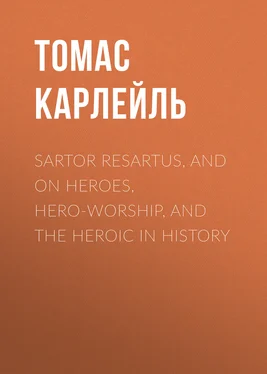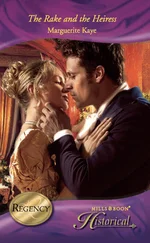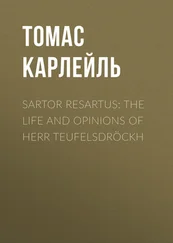Томас Карлейль - Sartor Resartus, and On Heroes, Hero-Worship, and the Heroic in History
Здесь есть возможность читать онлайн «Томас Карлейль - Sartor Resartus, and On Heroes, Hero-Worship, and the Heroic in History» — ознакомительный отрывок электронной книги совершенно бесплатно, а после прочтения отрывка купить полную версию. В некоторых случаях можно слушать аудио, скачать через торрент в формате fb2 и присутствует краткое содержание. Жанр: foreign_prose, literature_19, foreign_antique, на английском языке. Описание произведения, (предисловие) а так же отзывы посетителей доступны на портале библиотеки ЛибКат.
- Название:Sartor Resartus, and On Heroes, Hero-Worship, and the Heroic in History
- Автор:
- Жанр:
- Год:неизвестен
- ISBN:нет данных
- Рейтинг книги:4 / 5. Голосов: 1
-
Избранное:Добавить в избранное
- Отзывы:
-
Ваша оценка:
- 80
- 1
- 2
- 3
- 4
- 5
Sartor Resartus, and On Heroes, Hero-Worship, and the Heroic in History: краткое содержание, описание и аннотация
Предлагаем к чтению аннотацию, описание, краткое содержание или предисловие (зависит от того, что написал сам автор книги «Sartor Resartus, and On Heroes, Hero-Worship, and the Heroic in History»). Если вы не нашли необходимую информацию о книге — напишите в комментариях, мы постараемся отыскать её.
Sartor Resartus, and On Heroes, Hero-Worship, and the Heroic in History — читать онлайн ознакомительный отрывок
Ниже представлен текст книги, разбитый по страницам. Система сохранения места последней прочитанной страницы, позволяет с удобством читать онлайн бесплатно книгу «Sartor Resartus, and On Heroes, Hero-Worship, and the Heroic in History», без необходимости каждый раз заново искать на чём Вы остановились. Поставьте закладку, и сможете в любой момент перейти на страницу, на которой закончили чтение.
Интервал:
Закладка:
Thomas Carlyle
Sartor Resartus, and On Heroes, Hero-Worship, and the Heroic in History
INTRODUCTION
One of the most vital and pregnant books in our modern literature, “Sartor Resartus” is also, in structure and form, one of the most daringly original. It defies exact classification. It is not a philosophic treatise. It is not an autobiography. It is not a romance. Yet in a sense it is all these combined. Its underlying purpose is to expound in broad outline certain ideas which lay at the root of Carlyle’s whole reading of life. But he does not elect to set these forth in regular methodic fashion, after the manner of one writing a systematic essay. He presents his philosophy in dramatic form and in a picturesque human setting. He invents a certain Herr Diogenes Teufelsdröckh, an erudite German professor of “Allerley-Wissenschaft,” or Things in General, in the University of Weissnichtwo, of whose colossal work, “Die Kleider, Ihr Werden und Wirken” (On Clothes: Their Origin and Influence), he represents himself as being only the student and interpreter. With infinite humour he explains how this prodigious volume came into his hands; how he was struck with amazement by its encyclopædic learning, and the depth and suggestiveness of its thought; and how he determined that it was his special mission to introduce its ideas to the British public. But how was this to be done? As a mere bald abstract of the original would never do, the would-be apostle was for a time in despair. But at length the happy thought occurred to him of combining a condensed statement of the main principles of the new philosophy with some account of the philosopher’s life and character. Thus the work took the form of a “Life and Opinions of Herr Teufelsdröckh,” and as such it was offered to the world. Here, of course, we reach the explanation of its fantastic title—“Sartor Resartus,” or the Tailor Patched: the tailor being the great German “Clothes-philosopher,” and the patching being done by Carlyle as his English editor.
As a piece of literary mystification, Teufelsdröckh and his treatise enjoyed a measure of the success which nearly twenty years before had been scored by Dietrich Knickerbocker and his “History of New York.” The question of the professor’s existence was solemnly discussed in at least one important review; Carlyle was gravely taken to task for attempting to mislead the public; a certain interested reader actually wrote to inquire where the original German work was to be obtained. All this seems to us surprising; the more so as we are now able to understand the purposes which Carlyle had in view in devising his dramatic scheme. In the first place, by associating the clothes-philosophy with the personality of its alleged author (himself one of Carlyle’s splendidly living pieces of characterisation), and by presenting it as the product and expression of his spiritual experiences, he made the mystical creed intensely human. Stated in the abstract, it would have been a mere blank -ism ; developed in its intimate relations with Teufelsdröckh’s character and career, it is filled with the hot life-blood of natural thought and feeling. Secondly, by fathering his own philosophy upon a German professor Carlyle indicates his own indebtedness to German idealism, the ultimate source of much of his own teaching. Yet, deep as that indebtedness was, and anxious as he might be to acknowledge it, he was as a humourist keenly alive to certain glaring defects of the great German writers; to their frequent tendency to lose themselves among the mere minutiæ of erudition, and thus to confuse the unimportant and the important; to their habit of rising at times into the clouds rather than above the clouds, and of there disporting themselves in regions “close-bordering on the impalpable inane;” to their too conspicuous want of order, system, perspective. The dramatic machinery of “Sartor Resartus” is therefore turned to a third service. It is made the vehicle of much good-humoured satire upon these and similar characteristics of Teutonic scholarship and speculation; as in the many amusing criticisms which are passed upon Teufelsdröckh’s volume as a sort of “mad banquet wherein all courses have been confounded;” in the burlesque parade of the professor’s “omniverous reading” ( e.g. , Book I, Chap. V); and in the whole amazing episode of the “six considerable paper bags,” out of the chaotic contents of which the distracted editor in search of “biographic documents” has to make what he can. Nor is this quite all. Teufelsdröckh is further utilised as the mouthpiece of some of Carlyle’s more extravagant speculations and of such ideas as he wished to throw out as it were tentatively, and without himself being necessarily held responsible for them. There is thus much point as well as humour in those sudden turns of the argument, when, after some exceptionally wild outburst on his eidolon’s part, Carlyle sedately reproves him for the fantastic character or dangerous tendency of his opinions.
It is in connection with the dramatic scheme of the book that the third element, that of autobiography, enters into its texture, for the story of Teufelsdröckh is very largely a transfigured version of the story of Carlyle himself. In saying this, I am not of course thinking mainly of Carlyle’s outer life. This, indeed, is in places freely drawn upon, as the outer lives of Dickens, George Eliot, Tolstoi are drawn upon in “David Copperfield,” “The Mill on the Floss,” “Anna Karénina.” Entepfuhl is only another name for Ecclefechan; the picture of little Diogenes eating his supper out-of-doors on fine summer evenings, and meanwhile watching the sun sink behind the western hills, is clearly a loving transcript from memory; even the idyllic episode of Blumine may be safely traced back to a romance of Carlyle’s youth. But to investigate the connection at these and other points between the mere externals of the two careers is a matter of little more than curious interest. It is because it incorporates and reproduces so much of Carlyle’s inner history that the story of Teufelsdröckh is really important. Spiritually considered, the whole narrative is, in fact, a “symbolic myth,” in which the writer’s personal trials and conflicts are depicted with little change save in setting and accessories. Like Teufelsdröckh, Carlyle while still a young man had broken away from the old religious creed in which he had been bred; like Teufelsdröckh, he had thereupon passed into the “howling desert of infidelity;” like Teufelsdröckh, he had known all the agonies and anguish of a long period of blank scepticism and insurgent despair, during which, turn whither he would, life responded with nothing but negations to every question and appeal. And as to Teufelsdröckh in the Rue Saint-Thomas de l’Enfer in Paris, so to Carlyle in Leith Walk, Edinburgh, there had come a moment of sudden and marvellous illumination, a mystical crisis from which he had emerged a different man. The parallelism is so obvious and so close as to leave no room for doubt that the story of Teufelsdröckh is substantially a piece of spiritual autobiography.
This admitted, the question arises whether Carlyle had any purpose, beyond that of self-expression, in thus utilising his own experiences for the human setting of his philosophy. It seems evident that he had. As he conceived them, these experiences possessed far more than a merely personal interest and meaning. He wrote of himself because he saw in himself a type of his restless and much-troubled epoch; because he knew that in a broad sense his history was the history of thousands of other young men in the generation to which he belonged. The age which followed upon the vast upheaval of the Revolution was one of widespread turmoil and perplexity. Men felt themselves to be wandering aimlessly “between two worlds, one dead, the other powerless to be born.” The old order had collapsed in shapeless ruin; but the promised Utopia had not been realised to take its place. In many directions the forces of reaction were at work. Religion, striving to maintain itself upon the dogmatic creeds of the past, was rapidly petrifying into a mere “dead Letter of Religion,” from which all the living spirit had fled; and those who could not nourish themselves on hearsay and inherited formula knew not where to look for the renewal of faith and hope. The generous ardour and the splendid humanitarian enthusiasms which had been stirred by the opening phases of the revolutionary movement, had now ebbed away; revulsion had followed, and with it the mood of disillusion and despair. The spirit of doubt and denial was felt as a paralysing power in every department of life and thought, and the shadow of unbelief lay heavy on many hearts.
Читать дальшеИнтервал:
Закладка:
Похожие книги на «Sartor Resartus, and On Heroes, Hero-Worship, and the Heroic in History»
Представляем Вашему вниманию похожие книги на «Sartor Resartus, and On Heroes, Hero-Worship, and the Heroic in History» списком для выбора. Мы отобрали схожую по названию и смыслу литературу в надежде предоставить читателям больше вариантов отыскать новые, интересные, ещё непрочитанные произведения.
Обсуждение, отзывы о книге «Sartor Resartus, and On Heroes, Hero-Worship, and the Heroic in History» и просто собственные мнения читателей. Оставьте ваши комментарии, напишите, что Вы думаете о произведении, его смысле или главных героях. Укажите что конкретно понравилось, а что нет, и почему Вы так считаете.












